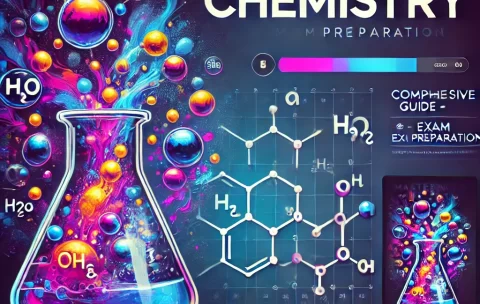Sorry, we can not find any courses for this search.
You may want to check Our Hot Courses:
Effective Use Of English
What you'll learn
at the end of the course, students should be able to communicate effectively in different situations and settings with LI, ESL and EFL speakers alike using,
authentic appropriate and correct linguistic form; communicate effectively in subject matter areas in general, thus equipping them with the requisite linguistic skills for pursuing university education in their field of specialisation
Mathematics Made Easy – Advance
What you'll learn
Here are some common mathematics learning objectives, organized by topic:
Arithmetic:
1. Perform addition, subtraction, multiplication, and division operations with whole numbers, fractions, and decimals.
2. Understand place value and rounding numbers.
3. Apply basic arithmetic operations to solve real-world problems.
Algebra:
1. Simplify expressions and solve linear equations.
2. Graph linear equations and inequalities.
3. Solve quadratic equations and systems of equations.
4. Understand functions, including domain and range.
Measurement:
1. Convert between units of measurement (length, mass, capacity).
2. Calculate perimeter, area, and volume.
3. Understand time and money concepts.
Data Analysis and Graphs:
1. Interpret and create graphs (bar, line, pie).
2. Analyze and summarize data.
3. Understand basic statistics (mean, median, mode).
Number Theory:
1. Understand divisibility rules.
2. Identify prime and composite numbers.
3. Apply basic number theory concepts (gcd, lcm).
Ratios and Proportions:
1. Understand equivalent ratios.
2. Apply proportions to solve problems.
3. Identify similar figures.
Problem-Solving:
1. Apply mathematical concepts to real-world problems.
2. Develop critical thinking and reasoning skills.
3. Communicate mathematical solutions effectively.
4. Use appropriate tools strategically.
5. Attend to precision.
By Grade Level, Elementary (Grades 1-5):
1. Basic arithmetic operations
2. Shapes and geometry
3. Measurement
4. Data analysis
Middle School (Grades 6-8):
1. Pre-algebra and algebra
2. Geometry
3. Measurement
4. Data analysis
High School (Grades 9-12):
1. Algebra
2. Geometry
3. Trigonometry
4. Statistics and probability
These objectives serve as a general outline. Specific objectives may vary depending on curriculum, region, or educational institution.
Mastering High School Chemistry
What you'll learn
Core Chemistry concepts
Solve chemistry problems
Apply chemistry principles Analyze chemical reactions
Prepare confidently for exams
INTRODUCTION TO HTML
What you'll learn
The knowledge is vital to understand the basis of programming of any kind
Mathematic Made Easy – Basic
What you'll learn
Here are some common mathematics learning objectives, organized by topic:
Arithmetic:
1. Perform addition, subtraction, multiplication, and division operations with whole numbers, fractions, and decimals.
2. Understand place value and rounding numbers.
3. Apply basic arithmetic operations to solve real-world problems.
Algebra:
1. Simplify expressions and solve linear equations.
2. Graph linear equations and inequalities.
3. Solve quadratic equations and systems of equations.
4. Understand functions, including domain and range.
Measurement:
1. Convert between units of measurement (length, mass, capacity).
2. Calculate perimeter, area, and volume.
3. Understand time and money concepts.
Data Analysis and Graphs:
1. Interpret and create graphs (bar, line, pie).
2. Analyze and summarize data.
3. Understand basic statistics (mean, median, mode).
Number Theory:
1. Understand divisibility rules.
2. Identify prime and composite numbers.
3. Apply basic number theory concepts (gcd, lcm).
Ratios and Proportions:
1. Understand equivalent ratios.
2. Apply proportions to solve problems.
3. Identify similar figures.
Problem-Solving:
1. Apply mathematical concepts to real-world problems.
2. Develop critical thinking and reasoning skills.
3. Communicate mathematical solutions effectively.
4. Use appropriate tools strategically.
5. Attend to precision.
By Grade Level, Elementary (Grades 1-5):
1. Basic arithmetic operations
2. Shapes and geometry
3. Measurement
4. Data analysis
Middle School (Grades 6-8):
1. Pre-algebra and algebra
2. Geometry
3. Measurement
4. Data analysis
High School (Grades 9-12):
1. Algebra
2. Geometry
3. Trigonometry
4. Statistics and probability
These objectives serve as a general outline. Specific objectives may vary depending on curriculum, region, or educational institution.
Mechanical Engineering and Electrical Engineering Explained
What you'll learn
Apply best practices and knowledge to think through a problem rather than try to memorise the solution.
Be able to identify many electrical and mechanical machines.
Apply engineering concepts across multiple engineering disciplines.
Start Trading Stocks Using Technical Analysis!
What you'll learn
Trade stocks like the pros!
Avoid the common mistakes that new traders tend to make.
Calculate support & resistance to measure risk vs. reward.
Learn the psychology behind investor decisions.
Identify the 4 stages of a trend.
Buy & sell stock with confidence!
Successful Negotiation: Master Your Negotiating Skills
What you'll learn
Negotiate effectively and fairly to make 1000s more than they would otherwise
Be confident in starting and finishing a negotiation
Use smart tactics to increase their bargaining power
Develop mental and emotional strength to keep pushing until they get a great price
Use negotiating skills in both personal and professional situations
Bargain over everything from huge corporate deals, to flea market haggles
Combat common techniques to ensure their profit isn't diminished without them noticing
Time Management Mastery: Do More, Stress Less
What you'll learn
Use your single trusted system to collect and manage your tasks
Prioritize effectively to make sure you're working on the right things, at the right time
Plan your daily, weekly, and long-term work & goals to save time and reduce stress
Use single-tasking, time blocking, documentation and breaks to more effectively focus on the job
Angular – The Complete Guide (2020 Edition)
What you'll learn
Develop modern, complex, responsive and scalable web applications with Angular 11
Fully understand the architecture behind an Angular application and how to use it
Use the gained, deep understanding of the Angular fundamentals to quickly establish yourself as a frontend developer
Create single-page applications with one of the most modern JavaScript frameworks out there













